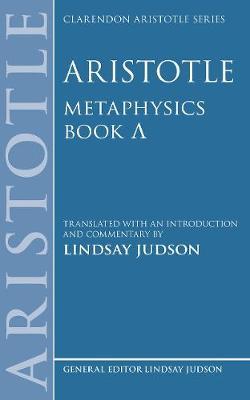Aristotle, Metaphysics Lambda

Aristotle, Metaphysics Lambda
material.
Lindsay Judson provides a rigorous translation of the twelfth book (Lambda) of Aristotle's Metaphysics and a detailed philosophical commentary. Lambda is an outline for a much more extended work in metaphysics - or more accurately, since Aristotle does not use the term 'metaphysics', in what he calls 'first philosophy', the inquiry into 'the principles and causes of all things'. Aristotle discusses the principles of natural and changeable substances, which include
form, matter, privation and efficient cause; he argues that principles of this sort are, at least by analogy, the principles of non-substantial items as well. In the second half of the book he turns to unchanging, immaterial substances, first arguing that there must be at least one such substance, which he calls 'God', to act as
the 'prime unmoved mover', the source of all change in the natural world. He then explores the nature of God and its activity of thinking (it is the fullest exposition there is of Aristotle's extraordinary and very difficult conception of his supreme god, its goodness, and its activity), and in the course of arguing for a plurality of immaterial unmoved movers he provides important evidence for the leading astronomical theory of his day (by Eudoxus) and for his own highly impressive
cosmology. The commentary on each chapter or pair of chapters is preceded by a Prologue, which sets the scene for Aristotle's often very compressed discussion, and explores the general issues raised by that discussion. The Introduction discusses the place of Lambda in the Metaphysics, and offers a solution to
the problem of the unity of Aristotle's project in the book.
PRP: 289.95 Lei
Acesta este Pretul Recomandat de Producator. Pretul de vanzare al produsului este afisat mai jos.
260.95Lei
260.95Lei
289.95 LeiIndisponibil
Descrierea produsului
material.
Lindsay Judson provides a rigorous translation of the twelfth book (Lambda) of Aristotle's Metaphysics and a detailed philosophical commentary. Lambda is an outline for a much more extended work in metaphysics - or more accurately, since Aristotle does not use the term 'metaphysics', in what he calls 'first philosophy', the inquiry into 'the principles and causes of all things'. Aristotle discusses the principles of natural and changeable substances, which include
form, matter, privation and efficient cause; he argues that principles of this sort are, at least by analogy, the principles of non-substantial items as well. In the second half of the book he turns to unchanging, immaterial substances, first arguing that there must be at least one such substance, which he calls 'God', to act as
the 'prime unmoved mover', the source of all change in the natural world. He then explores the nature of God and its activity of thinking (it is the fullest exposition there is of Aristotle's extraordinary and very difficult conception of his supreme god, its goodness, and its activity), and in the course of arguing for a plurality of immaterial unmoved movers he provides important evidence for the leading astronomical theory of his day (by Eudoxus) and for his own highly impressive
cosmology. The commentary on each chapter or pair of chapters is preceded by a Prologue, which sets the scene for Aristotle's often very compressed discussion, and explores the general issues raised by that discussion. The Introduction discusses the place of Lambda in the Metaphysics, and offers a solution to
the problem of the unity of Aristotle's project in the book.
Detaliile produsului








